Audi Q4 e-tron VS Nissan Leaf
Audi Q4 e-tron
The Audi Q4 e-tron seamlessly combines sustainable driving with premium comfort, embodying the brand's commitment to electric mobility. Its sleek design and spacious interior create an inviting atmosphere, perfect for those who appreciate both style and practicality. With a focus on innovative technology, the Q4 e-tron offers a dynamic driving experience that appeals to modern drivers seeking eco-friendly alternatives.
more informationNissan Leaf
The Nissan Leaf stands out as a pioneering model in the realm of electric vehicles, known for its impressive blend of practicality and eco-friendliness. It offers a smooth and quiet driving experience, making it an ideal choice for city commuting and longer journeys alike. The interior design is both comfortable and intuitive, providing drivers with a sense of modernity and ease of use.
more information @ audi-mediacenter.com
@ audi-mediacenter.com
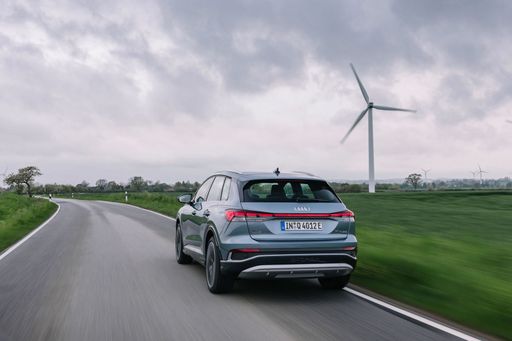 @ audi-mediacenter.com
@ audi-mediacenter.com
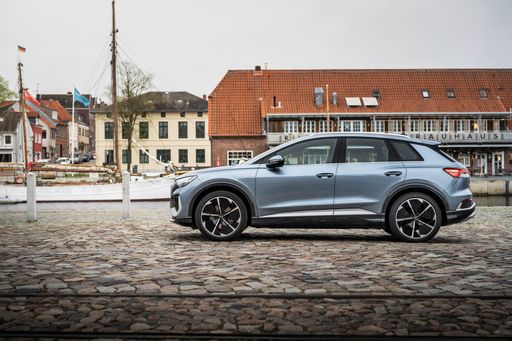 @ audi-mediacenter.com
@ audi-mediacenter.com
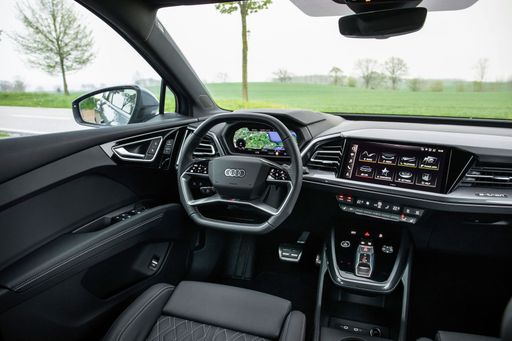 @ audi-mediacenter.com
@ audi-mediacenter.com
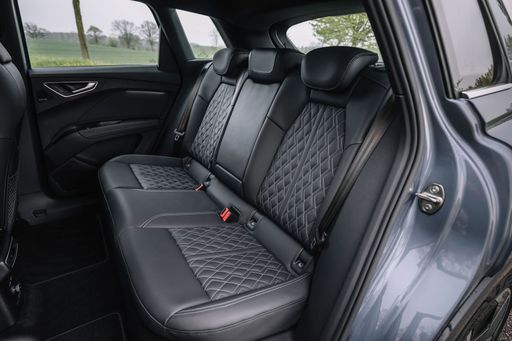 @ audi-mediacenter.com
@ audi-mediacenter.com
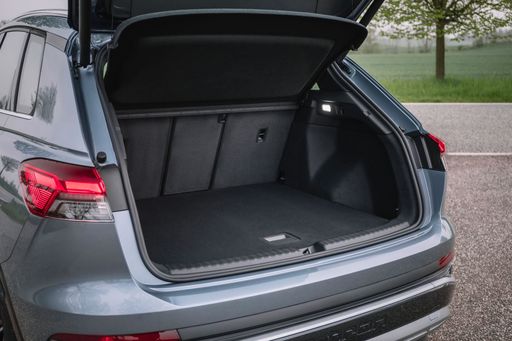 @ audi-mediacenter.com
@ audi-mediacenter.com
 @ germany.nissannews.com
@ germany.nissannews.com
 @ germany.nissannews.com
@ germany.nissannews.com
 @ germany.nissannews.com
@ germany.nissannews.com
 @ germany.nissannews.com
@ germany.nissannews.com
Costs and Consumption |
|
|---|---|
|
Price
about 39100 - 58800
£
|
Price
about 30800 - 37200
£
|
|
Consumption L/100km
-
|
Consumption L/100km
-
|
|
Consumption kWh/100km
15.9 - 17.4
kWh
|
Consumption kWh/100km
16.7 - 17.8
kWh
|
|
Electric Range
350 - 554
km
|
Electric Range
270 - 385
km
|
|
Battery Capacity
52 - 77
kWh
|
Battery Capacity
39 - 59
kWh
|
|
co2
0
g/km
|
co2
0
g/km
|
|
Fuel tank capacity
-
|
Fuel tank capacity
-
|
Dimensions and Body |
|
|
Body Type
SUV
|
Body Type
Hatchback
|
|
Seats
5
|
Seats
5
|
|
Doors
5
|
Doors
5
|
|
Curb weight
1990 - 2235
kg
|
Curb weight
1580 - 1756
kg
|
|
Trunk capacity
520 - 535
L
|
Trunk capacity
385 - 394
L
|
|
Length
4588
mm
|
Length
4490
mm
|
|
Width
1865
mm
|
Width
1788
mm
|
|
Height
1614 - 1632
mm
|
Height
1540 - 1545
mm
|
|
Payload
510 - 515
kg
|
Payload
384 - 415
kg
|
Engine and Performance |
|
|
Engine Type
Electric
|
Engine Type
Electric
|
|
Transmission
Automatic
|
Transmission
Automatic
|
|
Transmission Detail
Reduction Gearbox
|
Transmission Detail
Reduction Gearbox
|
|
Drive Type
Rear-Wheel Drive, All-Wheel Drive
|
Drive Type
Front-Wheel Drive
|
|
Power HP
170 - 340
HP
|
Power HP
150 - 217
HP
|
|
Acceleration 0-100km/h
5.4 - 9
s
|
Acceleration 0-100km/h
6.9 - 7.9
s
|
|
Max Speed
160 - 180
km/h
|
Max Speed
144 - 157
km/h
|
|
Torque
310 - 679
Nm
|
Torque
320 - 340
Nm
|
|
Number of Cylinders
-
|
Number of Cylinders
-
|
|
Power kW
125 - 250
kW
|
Power kW
110 - 160
kW
|
|
Engine capacity
-
|
Engine capacity
-
|
|
Top speed
160 - 180
km/h
|
Top speed
144 - 157
km/h
|
General |
|
|
Model Year
2023 - 2024
|
Model Year
2019
|
|
CO2 Efficiency Class
A
|
CO2 Efficiency Class
A
|
|
Brand
Audi
|
Brand
Nissan
|
Audi Q4 e-tron
Introducing the Audi Q4 e-tron: The Future of Electric Mobility
The Audi Q4 e-tron marks a significant leap forward in the world of electric vehicles, combining luxury, performance, and cutting-edge technology into one dynamic package. As part of Audi's e-tron family, this SUV not only offers a sustainable alternative to traditional fuels but does so with the unmistakable elegance and comfort that the brand is renowned for.
Engine and Performance: Power Meets Efficiency
The Q4 e-tron is available in various configurations, showcasing Audi's commitment to offering choices suited to different driving styles and needs. With power outputs ranging from 170 PS to 340 PS, the Q4 e-tron allows enthusiasts and casual drivers alike to enjoy a spirited driving experience.
One of the standout features of the Q4 e-tron is its efficient energy consumption. Models achieve consumption figures as low as 15.9 kWh/100 km, enabling impressive ranges of up to 554 km on a single charge. This makes the Q4 e-tron not only a competent urban commuter but also a capable vehicle for longer journeys. The acceleration from 0-100 km/h varies between 5.4 and 9 seconds, depending on the configuration, allowing drivers to enjoy a thrilling performance without compromising on efficiency.
Battery Technology: Powering the Future
Equipped with a battery capacity ranging from 52 kWh to 77 kWh, the Audi Q4 e-tron features impressive charging capabilities. The intelligent battery management system optimally uses the stored energy, balancing performance with efficiency. This innovative approach ensures that owners can maximise the electric range without the need for frequent recharges.
Innovative Interior and Technology
Inside the Audi Q4 e-tron, luxurious materials and modern design come together seamlessly. The spacious cabin is designed for five passengers, offering ample legroom and luggage space of 520 to 535 litres, making it practical for everyday use. The digital cockpit, complete with a high-resolution display, provides essential information at a glance, while the intuitive infotainment system seamlessly integrates with smartphones for an enhanced connectivity experience.
Sustainability and Driving Dynamics
Sustainability is at the core of the Audi Q4 e-tron's design. The vehicle not only produces zero emissions but also incorporates recycled materials in its manufacturing processes, showcasing Audi's commitment to eco-friendly production. Furthermore, with optional all-wheel drive capabilities available, the Q4 e-tron ensures excellent traction and stability, regardless of road conditions, making every drive enjoyable and secure.
Conclusion: A Symbol of Electric Elegance
The Audi Q4 e-tron epitomises the brand's drive towards a more sustainable future while maintaining the performance and luxury that customers expect. With its diverse range of configurations, advanced technology, and commitment to efficiency, the Q4 e-tron is not just another electric vehicle—it's a bold statement in automotive innovation. As we move forward, this vehicle is set to become a benchmark in the electric SUV segment, offering an exemplary blend of comfort, performance, and technology.
Nissan Leaf
Introduction to the Nissan Leaf: A Pioneer in Electric Mobility
The Nissan Leaf has established itself as a trailblazer in the realm of electric vehicles (EVs) since its launch. As we delve into its present-day iterations, the Leaf continues to soar in popularity due to remarkable advancements in technology and sustainability. Let's explore what makes the Nissan Leaf a standout in today's automotive market.
Power and Performance: Under the Hood of the Nissan Leaf
The Nissan Leaf boasts a power output ranging from 150 to 217 PS, depending on the battery option chosen. The vehicle's electric motor, a product of cutting-edge engineering, offers instant torque ranging from 320 to 340 Nm, resulting in impressive acceleration capabilities. The 0 to 100 km/h dash is achieved in as little as 6.9 seconds, showcasing its prowess in electric performance.
Battery Technology: Efficient Energy Management
When discussing the Nissan Leaf, battery technology is at the forefront. The available battery capacities range from 39 to 59 kWh, supporting an electric range between 270 to 385 km. This flexibility allows drivers to choose a model that best fits their driving habits, providing peace of mind for longer journeys without frequent recharging.
Sustainability: The Environmental Edge
One of the primary attractions of the Nissan Leaf is its commitment to sustainability. As an all-electric vehicle, it produces zero CO2 emissions, placing it in the top tier of the CO2-efficiency class with an 'A' rating. This clean energy approach contributes significantly to reducing environmental impact and supports Nissan's drive towards a greener future.
Design and Comfort: Aesthetic Appeal and Practicality
The Nissan Leaf is not just about efficiency; it's also designed for comfort and utility. With its sleek hatchback body and dimensions of 4490 mm in length, 1788 mm in width, and a height of up to 1545 mm, it offers ample interior space. The boot capacity ranges from 385 to 394 litres, providing sufficient storage for everyday needs. The model accommodates five passengers comfortably, ensuring a pleasant ride for everyone.
Innovations and Safety: Advanced Features for Peace of Mind
Nissan equips the Leaf with an array of intelligent features that enhance safety and convenience. The available equipment lines, including N-CONNECTA, Tekna, e+ N-CONNECTA, and e+ Tekna, offer varying levels of technology integration. ProPILOT Assist, e-Pedal, and a comprehensive suite of driver-assistance technology are just a few examples that highlight Nissan's commitment to innovation in the EV market.
Conclusion: The Nissan Leaf Continues to Lead
With prices ranging from €35,900 to €43,400, the Nissan Leaf remains an attractive choice for those looking to embrace electric mobility. It perfectly balances performance, design, and sustainability, making it a compelling choice in the competitive EV landscape. The Nissan Leaf not only represents the future of driving but also reinforces why it continues to be a leader in the electric vehicle community.
